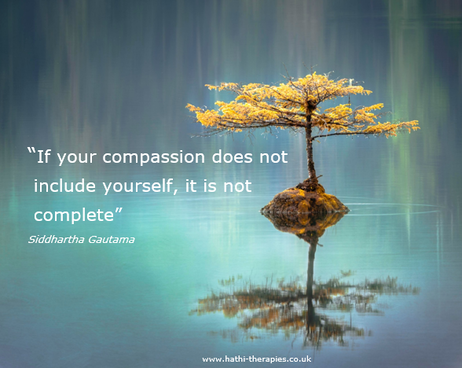|
So, recently I have been thinking about developing my own self-compassion…. After all I know I’m a work in progress! I believe we ALL are! Self-compassion is often spoken about as “being kind to yourself” but that isn’t the whole meaning of compassion. I don’t think compassion just happens; it’s a practice that can be developed and research is suggesting that compassion and mindfulness can actually make changes to the brain that helps improve our stress response. Compassion is about connecting with another human being on an equal footing and we also know that connection with others is a fundamental human need. I often encourage clients in learning self-compassion, but I realised (once again!) that I’m not always “taking my own medicine” outside of sessions. As a therapist I believe I can be intuitive and compassionate but I’m also human and that means not infallible. To be fair during my sessions I probably demonstrate more self-compassion than I always do outside of session!! (Not that I don't try - because I do but the reality is we all have to try harder sometimes! And old habits need a bit of work! We need to pay attention to ourselves)
I guess for a start, listening to yourself and being curious..... I do try to notice my own discomfort and check in on my inner dialogue but an incident a couple of days ago led me to re-evaluate my self-compassion! On this occasion, I really “heard” my self-talk…. the content seemed to develop a “rational” answer, but it wasn’t really resonating true and I suddenly realised it wasn’t what I was saying but how I was saying it. I wasn’t believing it, I wasn’t “feeling it” and the reason? It was all in the tone! Because my internal dialogue wasn’t that of an “equal” - my tone to myself was condescending and berating. It wasn’t how I would speak to someone else! Although my words “that’s not helpful right now….” were accurate, in acknowledging my tone (which made it sound more like a “well that’s not helpful is it?!.... tut-tut you shouldn’t think like that...” kind-of-tone) I was able to repeat it in a more compassionate and helpful way; acknowledging that I felt uncomfortable, that what I was experiencing was normal human stuff and I could do something different if I wanted. By forgiving myself for being human and not “telling myself off” I allowed myself to believe, to feel, that something else was possible.
The Cambridge dictionary defines compassion as a strong feeling of sympathy and sadness for other people’s suffering or bad luck and a desire to help”. It implies some kind of suffering together BUT with the aim of moving forward. So, compassion for others engages us in feeling both emotionally and physically another’s pain/suffering. However, compassion is not just about empathy; putting yourself in (what it might be like to be in) someone else's shoes, nor is it about personalising their pain or being kind at the expense of moving forward, (although kindness may be shown in compassion). So for instance, it’s not about just reassuring ourselves that everything is ok – because in fact everything ISN’T always ok! Sometimes what is needed is honesty and that can involve discomfort. Although compassion is not cruel and un-thinking, it can sometimes also take a confidence/courage to say what is needed, perhaps, especially to ourselves; but with compassion there IS a belief that there will be a way forward. Sometimes this might include saying something is not ok or saying “no” to something but it in a way that demonstrates an equality i.e. not pitying, berating or talking down but respecting the other as one human being to another (or to yourself as a human being) . sometimes we also need to notice and acknowledge our less helpful traits, acknowledge when something isn’t ok, learn to tolerate the discomfort; and with mindful awareness of our discomfort we might develop a way forward and allow ourselves to “let go” of mind blocking negative feelings such as guilt, shame and anger. Like the process of forgiveness in which no one is let off the hook; we are all accountable for our own thoughts and behaviour, but we don’t have to hold them unchanged and therefore hold negative feeling. There are some things that just aren’t ok but in reminding ourselves of healthy boundaries and accepting that we are not infallible we can keep trying to do something that is helpful.
5 Comments
7/12/2018 06:16:51 pm
I really enjoyed this blog article, Helen. I’ve learnt a great deal about the importance of self-care and also about making my inner voice more compassionate.
Reply
Glad you liked it! I agree about your comment about "nice fluffy things" too! I'm all for promoting a positive sense of yourself but being positive about things on its own isn't always the most helpful thing to do. As they say "shit happens"!! ....the things that happen in life aren't always positive - I often hear people in the most incredibly sad or difficult situations saying "I'm trying to stay positive". It might help in them manage in the short term but that statement tends to hide a whole lot of pain! I believe here is a way through but staying positive alone doesn't always work.We can however build resilience and bring some balance into our thoughts.
Reply
25/4/2020 08:30:40 pm
That quote you cited from Siddhartha Gautama is the perfect explanation of what compassion is all about. When we hear the word "compassion", we always get the idea that it is about being kind to other people. The focus is always on other people and we tend to forget about ourselves. However, just like Siddhartha Gautama said, true compassion is being compassionate to yourself, too. You cannot be compassionate to other people and then treat yourself like you do not matter. There should be a balance of both because you deserve the love you always give to other people. That is what true compassion is all about. 27/1/2020 12:47:57 pm
Self-compassion is the potency to cultivate inward acceptance and love. It is an act of self-indulgence. It is the ability to show empathy. If you don’t have compassion for yourself, then you can’t listen to your inner tone. On the contrary, if you have compassion for yourself, then you can easily maintain non-biased awareness of experience. A lack of self-compassion can make your psychological health condition critical. You may find it difficult to cultivate self-compassion after a troubling experience. Well, in that case, you need to keep up with a systematic self-care regimen.
Reply
17/5/2022 07:34:09 am
Awesome content. Thank you for sharing this wonderful information. It was very interesting.
Reply
Leave a Reply. |
Categories
All
AUTHORCognitive Behaviour Therapist, Integrative Psychotherapist, Nurse Specialist (Mental Health), Mum, Youth Worker, Trainer....... Archives
December 2018
|
Proudly powered by Weebly





 RSS Feed
RSS Feed